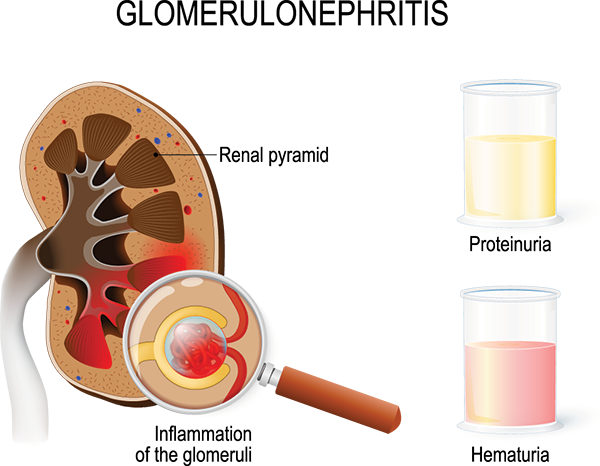A nurse is caring for a child who has acute glomerulonephritis.
Which of the following actions is the nurse's priority?
Check the child's daily weight.
Educate the parents about potential complications.
Place the child on a no-salt-added diet.
Maintain a saline lock.
The Correct Answer is A
Nursing care planning goals for a child with acute glomerulonephritis are directed toward the excretion of excess fluid through urination.
Monitoring fluid status is very important and daily weights are an effective way to monitor fluid retention, as weight gain is the earliest sign of fluid retention.
Choice B, Educating the parents about potential complications, is important but not the nurse’s priority.
Choice C, Place the child on a no-salt-added diet, which may be part of the treatment
plan but is not the nurse’s priority.
Choice D, Maintaining a saline lock, may be necessary for administering medications but is not the nurse’s priority.

Nursing Test Bank
Naxlex Comprehensive Predictor Exams
Related Questions
Correct Answer is B
Explanation
A cerebral palsy is a group of disorders that affect movement and muscle tone or posture.
It’s caused by damage that occurs to the immature, developing brain, most often before birth.
Signs and symptoms appear during infancy or preschool years.
In general, cerebral palsy causes impaired movement associated with exaggerated reflexes, floppiness or spasticity of the limbs and trunk, unusual posture, involuntary movements, unsteady walking, or some combination of these.
An 8-month-old infant with cerebral palsy may have developmental delays and may require pillow props to sit up.
Choice A, Tracking an object with eyes, is a normal developmental milestone for
an infant.
Choice C, Uses a pincer grasp to pick up a toy, is also a normal developmental
milestone for an infant.
Choice D, Smiles when a parent appears, is also a normal developmental milestone for an infant.
Correct Answer is A
Explanation
The nurse should place the client on a low-sodium, fluid-restricted diet.
Acute glomerulonephritis is a kidney disease that can cause fluid retention and edema.
A low-sodium diet can help reduce fluid retention and swelling.
Fluid restriction can also help manage fluid balance and prevent further complications.
Choice B is not the best answer because a regular diet with no added salt may still contain high levels of sodium.
Choice C is not the best answer because a low-protein, low-potassium diet may not address the client’s fluid retention and edema.
Choice D is not the best answer because a low-carbohydrate, low-protein diet may not provide adequate nutrition for the client.
Whether you are a student looking to ace your exams or a practicing nurse seeking to enhance your expertise , our nursing education contents will empower you with the confidence and competence to make a difference in the lives of patients and become a respected leader in the healthcare field.
Visit Naxlex, invest in your future and unlock endless possibilities with our unparalleled nursing education contents today
Report Wrong Answer on the Current Question
Do you disagree with the answer? If yes, what is your expected answer? Explain.
Kindly be descriptive with the issue you are facing.
